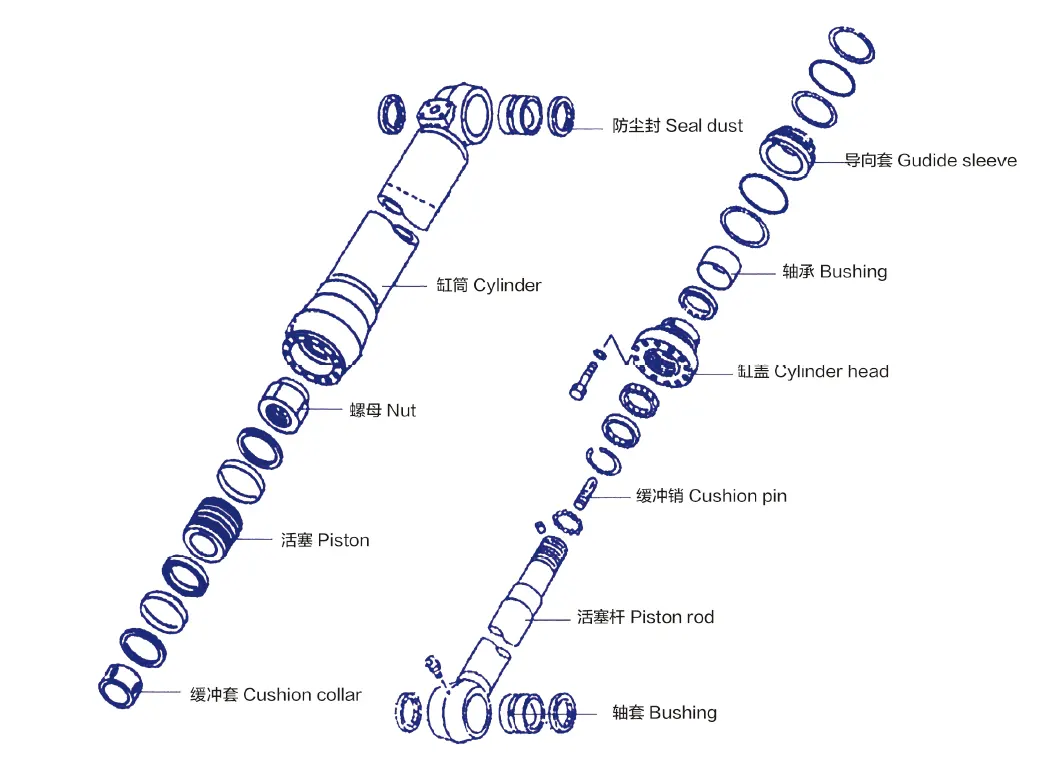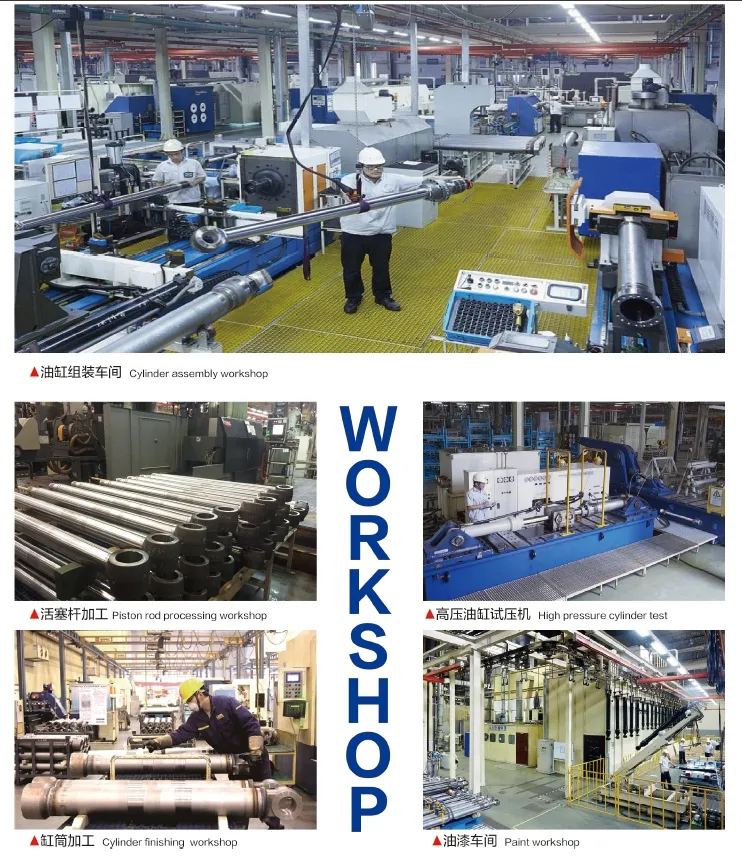Arm Cylinder For Jingong Crawler Excavator JCM924
Як один з виробників, постачальників та експортерів механічних виробів, ми пропонуємо гідравлічні циліндри та багато інших продуктів.
Будь ласка, зв'яжіться з нами для уточнення деталей.
Пошта:sales@hydraulic-cylinders.net
Виробник, постачальник, експортер гідравлічних циліндрів.
Arm Cylinder For Jingong Crawler Excavator JCM924
Definition and Explanation
An arm cylinder is a specially designed hydraulic cylinder that provides linear motion and power to the arm of various machinery, such as excavators, cranes, and robotic arms. The arm cylinder plays a crucial role in hydraulic systems, allowing for the efficient movement and control of attachments or accessories. These cylinders not only enable smooth motion but also withstand heavy loads, ensuring high efficiency and reliability of the machinery in various operating conditions.

Features of Arm Cylinder
- High-Efficiency Transmission: The arm cylinder provides powerful linear motion and force, ensuring high-performance capabilities for the mechanical arm in various operations.
- Precise Control: Through the hydraulic system, the arm cylinder enables precise motion control, making the operation of attached tools more flexible and accurate.
- Durability: Arm cylinders are typically made with high-strength materials, offering excellent wear and corrosion resistance, suitable for long-term use in harsh environments.
- Multi-functional Adaptability: These cylinders can be widely applied in various machinery, such as excavators, cranes, and robotic arms, adapting to different working requirements.
- Easy Maintenance: Designed with ease of maintenance and replacement in mind, regular inspections and servicing become more convenient, reducing equipment downtime.

Applications of Arm Cylinder
The arm cylinder finds applications in various industries and sectors:
- Construction Engineering: Used in excavators and cranes, the arm cylinder controls the movement of the bucket or boom for earthwork, material handling, and structural installation.
- Manufacturing Industry: In automated production lines, the arm cylinder facilitates the motion of robotic arms, performing tasks like assembly, welding, and material handling to improve production efficiency and accuracy.
- Agricultural Machinery: In agricultural machinery such as harvesters and seeders, the arm cylinder controls the movement of operating arms, executing tasks like seeding, fertilizing, and harvesting.
- Mining: In mining equipment, the arm cylinder controls the arm movement of mining machinery, enabling ore extraction and transportation.
- Logistics and Transportation: In forklifts and handling robots, the arm cylinder controls the lifting and movement of forks, facilitating material handling and stacking.
Design Considerations and Selection Standards
When designing arm cylinders, several factors and selection standards are taken into account:
- Load-Bearing Capacity: The arm cylinder is designed to withstand the specific load requirements of the machinery it supports.
- Sealing: Various sealing components, such as piston seals and rod seals, are used. These seals are made of wear-resistant materials like polyurethane and nitrile rubber. The cylinder body and threaded ends undergo precise treatments to enhance wear resistance.
- Durability: Arm cylinders are manufactured using high-quality materials and undergo rigorous testing to ensure durability and long service life.
- Safety: Safety considerations are integrated into the design, ensuring the safe operation of the machinery while using the arm cylinder.
- Maintainability: Easy maintenance and repairability are key factors in the design, enabling efficient inspection and reducing potential downtime.

Sealing and Lubrication
The arm cylinder utilizes various sealing components, such as piston seals and rod seals, which are made of wear-resistant materials like polyurethane and nitrile rubber. The cylinder body and threaded ends are finely treated to improve wear resistance. Regular lubrication with the appropriate hydraulic oil is required to ensure smooth operation and longevity.
Regular Inspection and Preventive Maintenance Measures
To maintain optimal performance and prevent potential issues, the following measures should be undertaken:
- Regularly inspect the arm cylinder for any signs of wear, damage, or leakage.
- Check and replace seals or other components as needed.
- Ensure proper lubrication of the cylinder.
- Follow recommended maintenance schedules provided by the manufacturer.
- Implement preventive maintenance measures to minimize potential problems.
Product Installation Guide
Proper installation of the arm cylinder is essential for its optimal functioning. Follow these steps for correct installation:
- Prepare the mounting area and ensure it is clean and free of any debris.
- Position the arm cylinder in the designated mounting location.
- Securely attach the cylinder using appropriate mounting brackets or fasteners.
- Connect the hydraulic lines according to the manufacturer’s specifications.
- Perform a thorough inspection to ensure proper installation before operation.

Safety Considerations and Environmental Factors
When using arm cylinders, it is crucial to prioritize safety measures to prevent accidents and ensure the well-being of operators and the surrounding environment. Safe operation includes adhering to proper operating procedures, using personal protective equipment, and providing adequate training to personnel.
Troubleshooting and Common Issues
Understanding potential faults and common problems can help in diagnosing and resolving issues. Some common issues associated with arm cylinders include:
- Leakage of hydraulic fluid
- Irregular or jerky movement
- Excessive noise during operation
- Failure to extend or retract
For troubleshooting and resolving these issues, consider the following tips:
- Check for any damaged or worn seals and replace them if necessary.
- Inspect hydraulic lines for leaks or blockages.
- Verify proper hydraulic fluid levels and quality.
- Ensure all connections and fittings are secure and undamaged.
- Refer to the manufacturer’s troubleshooting guide for specific issues.

Organize the article logically, using subheadings for easy navigation. Incorporate relevant images or charts to enhance understanding. Ensure the content is clear, concise, and suitable for readers with varying levels of technical knowledge.
作者: lyl
About Our Company
We are a professional manufacturer of replacement hydraulic cylinders, offering a wide range of products. We have become one of the leading manufacturers and wholesale distributors in the domestic and international markets. With a commitment to excellence, we rely on industrialized production management strategies in our refined manufacturing workshops to continuously improve our technical expertise and production efficiency.
By introducing high-end digital manufacturing equipment and professional testing systems, we optimize our manufacturing platform and enhance our product quality control processes, showcasing strong innovative capabilities. Our goal is to meet the diverse needs of customers with principles of efficiency, precision, and high quality.

Take a Tour of Our VR Factory:
Take a tour of our VR factory with the following
Hydraulic Cylinder Application:


